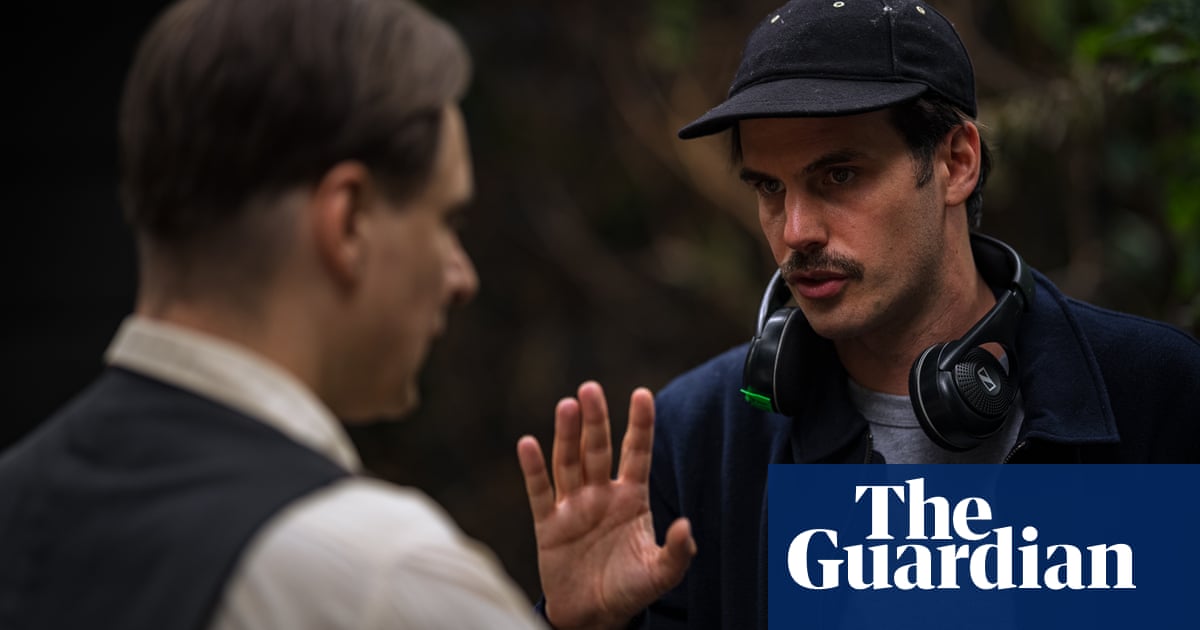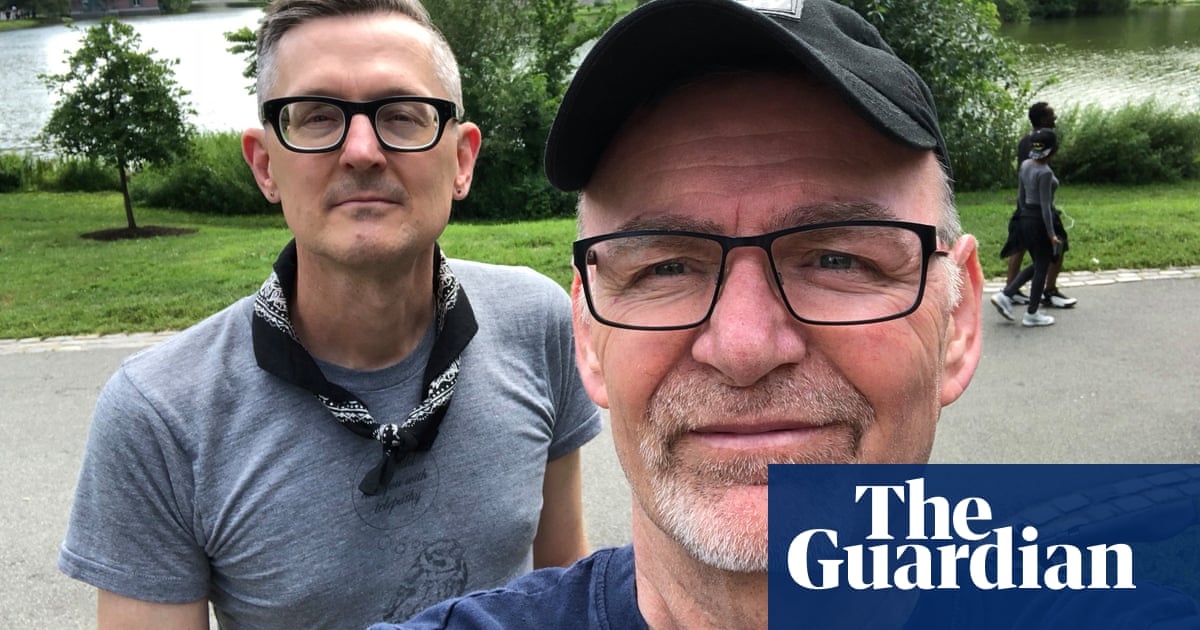
In an ironic twist, Russia’s wartime box office is being dominated by a blockbuster adaptation of Mikhail Bulgakov’s Master and Margarita, a film that denounces censorship and was filmed by an American director who is “vocally anti-war”.
One leading film critic, Anton Dolin, told the Guardian it was the “best commercial film ever shot in [Vladimir] Putin’s Russia”. A movie’s runaway success can work against it in Russia now: the film has had to run the gauntlet of pro-Kremlin propagandists and censors, and in true Hollywood fashion it has triumphed against the odds.
Michael Lockshin, the director, said it was “a miracle” the film came out, on a call from Los Angeles where he lives. “It was a very hard journey getting there since the war started,” he said.
For weeks after its release, Lockshin had mostly avoided the press. The reason was simple: an army of online trolls and pro-Kremlin pundits wanted him arrested and did not like his anti-war views, or the film’s excoriation of totalitarianism, or that some of its estimated $17m (£13m) budget – one of Russia’s largest film budgets ever – came from the state-backed Russian Cinema Fund.
“We know that when someone makes a film now, he is writing or making a film about now,” said Dolin. “And here it’s quite obvious. Because this is a moment in Russia where censorship is rife, and the film is dedicated against censorship and doesn’t obey that censorship is inspiring to audiences.”
Pro-Kremlin Telegram channels have demanded Lockshin be investigated for discrediting the Russian army and called him a terrorist. He has been attacked by Margarita Simonyan, the head of the state-controlled broadcaster RT, and Vladimir Solovyov, one of the most popular pro-Kremlin talkshow hosts. Russian tabloids have published details of where he lives (luckily often wrong) and he has received death threats.
Lockshin said it was “very unpleasant” and that the anger focused at him had been disconcerting. “I’ve always been kind of the guy behind the camera, I’ve never liked a lot of attention to myself. It was both scary to watch and felt like I wasn’t in control any more … like the movie was having a life of its own.”
His biggest concern had been how audiences would react to his artistic treatment of Bulgakov’s classic, which contains three stories: Pontius Pilate’s trial of Yeshua Ha-Notsri (Jesus of Nazareth) in Jerusalem, the devil Woland’s arrival in Moscow with his entourage and the story of the Master and his lover Margarita.
To tie the stories together, Lockshin has the Master write the novel Master and Margarita, adding a meta-narrative not included in Bulgakov’s original. That artistic licence could be seen as blasphemy: the novel is Russia’s most popular of the 20th century and has never found a worthy film adaptation.
Instead, Lockshin, the actors and the producers ended up in a political firestorm that reached the State Duma and national television. “For a week, we didn’t even know if they would ban the movie,” he said. “There was real discussion about that.”
As this drama played out, the themes of Stalinist censorship in the film played out in real time in modern-day Russia. And those events recalled the life of Bulgakov himself, whose novel was published decades after his death.
“I was just marvelling at the irony of it all, because it was kind of copying what happened to the book and Bulgakov in his time,” Lockshin said. “The people who were going after me and the propagandists [didn’t realise] how much they were cosplaying characters from the movie.”
Lockshin is an American-Russian film-maker who was born in the US and moved to the Soviet Union in 1986. His first feature film, Silver Skates, a period adventure film set in fin-de-siecle St Petersburg, premiered in 2020 and was acquired by Netflix the following year.
Art is under the microscope in Russia. The Kremlin has jailed anti-war artists but it has also punished some of its own “loyal” pop stars after Soviet-style denunciations for a display of decadence: attending a “nearly naked” party at a Moscow club before new year.
After soldiers complained to Putin about video from the party, attenders issued teary apologies on Instagram (which has also been banned) or appeared in the occupied territories of east Ukraine serenading soldiers as way to exculpate their guilt.
As far-right propagandists were looking for another scalp, the Master and Margarita came out on the big screen. The film was shot in 2021 and was going into post-production before Putin launched his invasion in Ukraine. Lockshin and the screenwriter Roman Kantor had developed the screenplay years earlier.
Lockshin said that at the time they thought: “This was a way of where Russia could go, if things don’t change … But on the other hand, it wasn’t like we knew what’s going to happen in two years, and that we would actually reach the level of Stalin’s purges in 2024 that we have reached today.”
The war changed everything, but Lockshin has remained outspoken. “Everyone … who started this invasion is a war criminal and they should all be tried and that’s my stance on it,” he said. He was not willing to be silent even to save the movie, “and this just made the movie go into limbo”.
Universal Pictures, which had signed on to distribute the film, exited the project in 2022. Concerned about his public stance, the Russian producers took Lockshin’s name off the promotional material of the film and later released a public statement saying Lockshin had “had nothing to do with the picture” since 2021.
That moment could recall an early scene in the film when the Master, a young playwright played by Yevgeny Tsyganov, is hauled before the Soviet Union of Writers, where his plays are banned and he is publicly denounced by his publisher.
But the producers did not abandon the project, Lockshin noted, despite “getting a lot of backlash for this” and being removed from the state-run Russian Cinema Fund, and it has become an unlikely hit in the country.
The public response was something he could not have foreseen, Lockshin said, as he had “virtually no screenings of this movie, no focus groups”. “I really had no idea how people would perceive this movie until it came out. I could only hope. And the reaction was, I would say, the best thing I could expect from the people that I respect.”
Even as the film found success, events in Russia are growing darker. Shortly after the Guardian first spoke to Lockshin, Alexei Navalny died in an Arctic prison colony in what has been seen by many as a political assassination. “He reflected this inner freedom, even while he was in prison and never showed any cowardice,” Lockshin said of the opposition leader. “That plays in heavily to the themes in this movie as well.”
As Russia becomes more repressive, it is possible that Master and Margarita could be one of the last films of its kind, a blockbuster where the criticism of the state lies on the service. And its popularity may act as a “catalyst … for the regime becoming even more repressive,” said Lockshin.
Dolin, the film critic, said: “After the scandal that this film elicited, I think we’re going to see the censor be much more active.”












